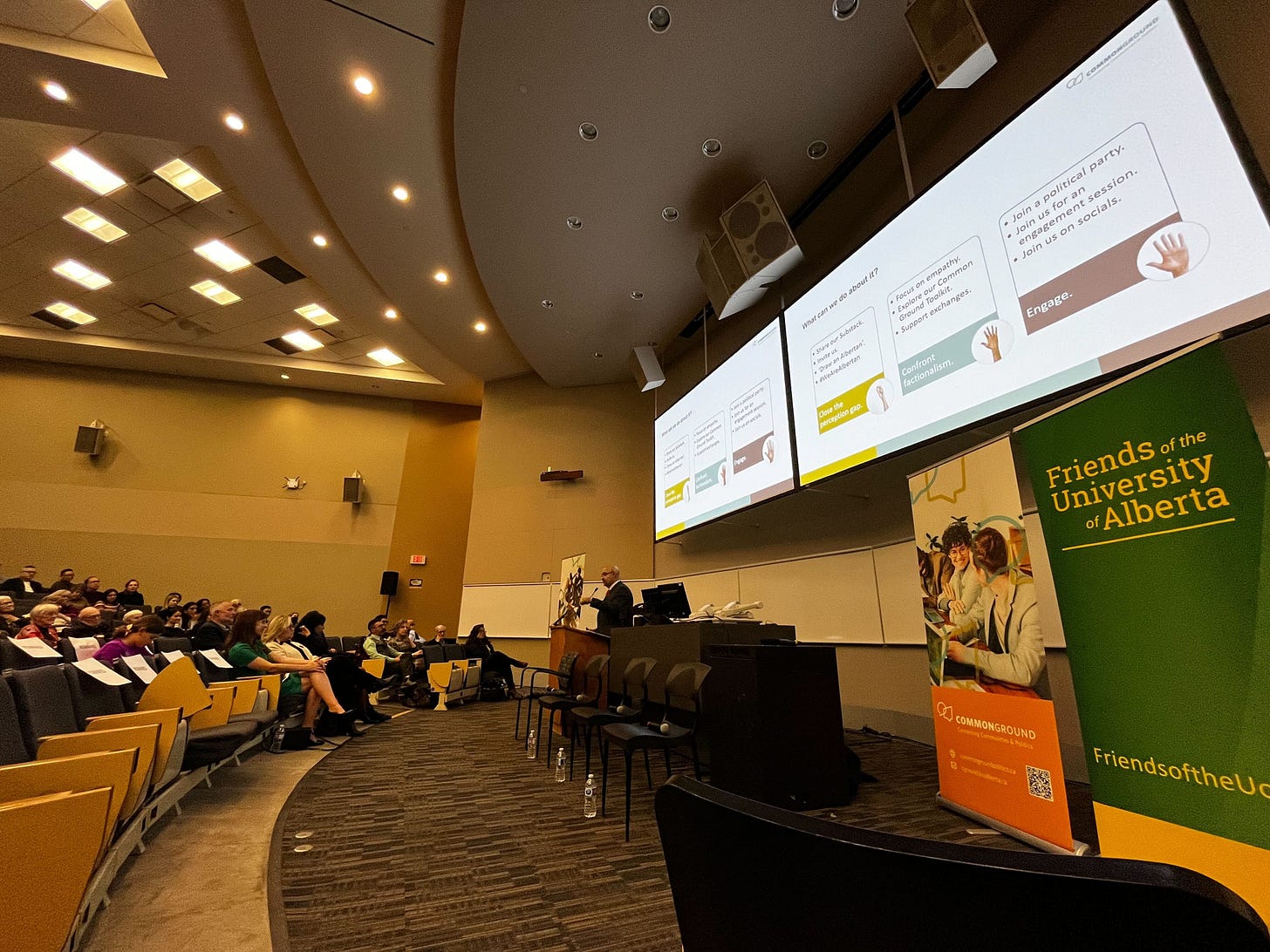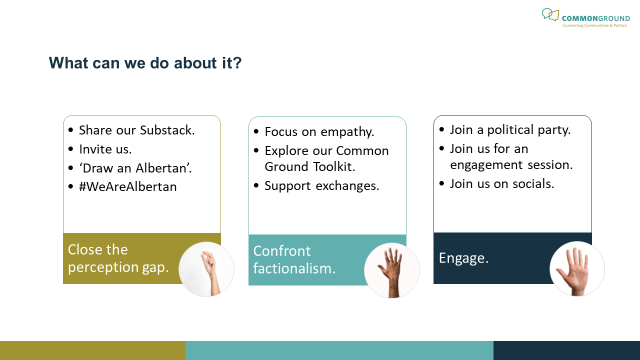Finding Common Ground in Polarizing Times
The 2024 Henry Marshall Tory Lecture by Jared Wesley
On November 6, I had the honour of presenting the 2024 Henry Marshall Tory Lecture, hosted by the Friends of the University of Alberta. Thank you to the hundreds who were able to join us in person and online. For those who missed it, here is a brief recap.
In my lecture, I tied together the main threads of our Common Ground research in the last 5 years and explored what I argue are the three key challenges in Alberta’s politics: growing polarization, policy misalignment, and democratic backsliding.
All three of these, I suggest, are fused by Albertans’ distorted sense of their broader community.
I’ll briefly explore each argument separately.
Partisan Polarization
First, while Alberta is certainly polarized, I find that these divisions largely reflect party loyalties rather than deep ideological rifts, or those rooted in ethnicity, language, religion, or gender. This distinction is important because it suggests a more manageable type of polarization, one that can be potentially reversed.
In and of itself, polarization is not inherently negative. After all liberal democracy involves competing alternatives for defining and achieving the public good. The problem arises when party divisions evolve into hostility, what we call affective polarization, and begin influencing our personal relationships, fracturing the bonds that unite our communities.
This is something Michael Ignatieff wrote about a decade ago, in his observations around American politics, warning about the dangers of treating our political opponents as enemies instead of adversaries.
According to our Viewpoint Alberta data, the level of partisan polarization in Alberta today is about what it was when Ignatieff penned his piece.
Policy Misalignment
There is also a concerning disconnect between the Alberta government’s policy agenda and public opinion. Our Viewpoint Alberta data shows that some government-backed policies enjoy only minority support, yet many Albertans perceive these stances as widely popular.
This perception gap silences moderate and progressive voices, even though they represent a significant portion of Alberta’s population.
Democratic Backsliding
Next, I addressed Alberta’s democratic backsliding which has involved the erosion of pluralism in our province – diminishing respect for a diversity of viewpoints– and weakened mechanisms for government accountability. This argument should not be new to followers of my Substack, but for those who would like to explore it further, I cover a lot of it in this article in the Tyee.
I then tied all three of these strands together. Polarization begets democratic backsliding by convincing us that it’s okay to cheat if it means keeping our enemies out of power. Policy misalignment further polarizes the electorate, reducing trust in government and pitting cabinet against large swaths of the public. And democratic backsliding makes it easier for the government to ignore public opinion by removing checks and balances on its authority.
Our Distorted View of Alberta
All three of these strands are connected to a fourth element of Alberta’s political environment: our distorted sense of collective self.
When most Albertans picture a typical member of their political community, they envision someone like “Joe” -- a white, middle-aged man working in a blue-collar job. This corresponds with the province’s wild west political culture: a set of often un-spoken values that tell us what it’s acceptable to say, do, or think when it comes to politics.
Joe is not the most common member of our communities.
Yet, Joe’s dominance of our politics feeds polarization. One small group of people aims to make Alberta great again in Joe’s image, crafting symbols and policies to reinforce his primary place in the economy and society. On the other side of the spectrum, another small group of people wants to “cancel” Joe -- to remove him from our political psyche for being backwards. The rest of us are caught in the middle, seeing value in Joe’s contribution to Alberta but wanting to expand the definition of what it means to be Albertan.
Joe also contributes to the political perception gap. If Albertans don’t think Joe would support a policy they feel strongly about, they’re less likely to raise their voices. On the other hand, if they do think Joe would be supportive, they are more likely to push for it.
Lastly, Joe’s political apathy makes democratic backsliding more socially acceptable. If Joe is willing to turn a blind eye, so, too, might be members of the governing party and the broader public.
What Can We Do?
The foregoing suggests a lot of doom and gloom. In the conclusion to my lecture, I laid out ways of breaking this vicious cycle.
We must look for ways to close the political perception gap, spreading the word about the real “mainstream” in Alberta politics. A lot more of us must also reconsider our own complicated relationship with the Alberta identity. In order to manifest a more inclusive vision of Alberta politics, we need to make it known that #WeAreAlbertan -- all of us.
I called upon people to confront factionalism head-on. By focusing on developing empathy (instead of casting our opponents as enemies, “baskets of deplorables,” or “garbage”), we can begin to build common ground. At the same time, we must make space for bridge-builders to do that important work, rather than treating them as traitors.
At Common Ground we’ve also developed a Toolkit to combat factionalism. Travelling across Alberta during the summer of 2024, we worked with residents of 9 communities, politicians, and community partners, such as Alberta Municipalities to create a set of resources designed to help identify behaviours that threaten core democratic values and institutions, as well as practical strategies and tactics for safely minimizing these behaviours.
In beta version now, the Toolkit will showcase infographics, short videos, social media content, and accessible documents designed to help Albertans and their leaders understand the common ground that unites them, and recognize, acknowledge, and combat factionalism in the public sphere.
Most importantly, I asked Albertans to engage in politics. The moderate middle has fallen silent, particularly since the pandemic, and it’s time to see more folks joining political parties and local advocacy groups. For our part, we are convening a series of engagement sessions across Alberta in the new year to reinvigorate local discussions around finding common ground. (You can sign up here).
We hope you will join us.










This was a great presentation and event Jared. You folks have been doing some excellent work.
I see you were not able to introduce Jane and Connor (the average Albertans) in this article, but the link provided highlights their preference for bipartisanship and working across the political divide. I would imagine Jane and Connor are not unlike the friends and family I speak with up here in the Capital region (except they cheer for a questionable hockey club), in that they are growing increasingly frustrated with what appears to be a policy agenda and political debate that no longer reflects their core interests, but instead those of a smaller minority of Albertans whom they find it difficult to relate to.
Despite this reality that your data reveals, politics seems to be heading in a different direction, somewhat disconnected from this preference to put policy over Party. There appears to be no penalty from Jane and Connor when politicians and their staffers no longer attempt to even relate to them or persuade them of their argument (post-persuasion) by swinging back to the middle in general elections to increase the “size of the tent.” On the contrary, it appears that the recipe for success these days, armed by more sophisticated tools, data, and analysis, is to activate the base, rage-farm for funding, micro-target small niche demographics, emphasize in-group/out-group dynamics, and campaign on behalf of a smaller yet more motivated group that do not share Jane and Connor’s vision for the province/country.
I’m curious about your thoughts on this disconnect between Jane and Connor’s desires and the increasing trend in politics to move to the extremes of the political spectrum. Can you expand on this?
Once again, it was a great event this evening and I enjoyed your lecture.
Hi! Can you please help with the link "You can sign up here" in the second last paragraph which appears to be disabled.
Please advise where we can sign up to join in these upcoming session. Appreciate your work. Thank you.